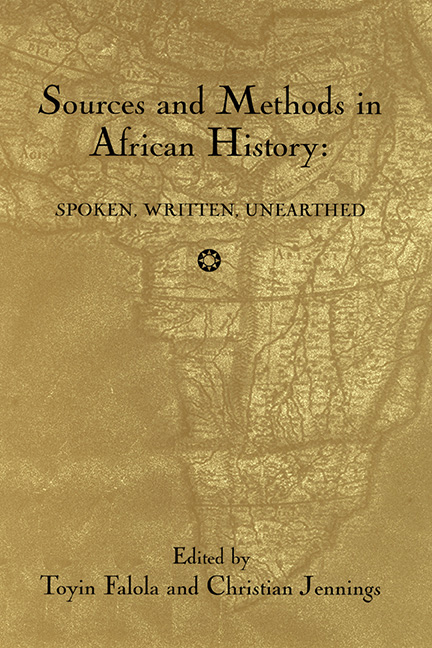Book contents
- Frontmatter
- Dedication
- Contents
- Acknowledgments
- Introduction
- Part I Archaeological Sources
- Part II Africa and the Atlantic World
- 6 Section Introduction: Methodology through the Ethnic Lens: The Study of Atlantic Africa
- 7 Pathways to African Ethnicity in the Americas: African National Associations in Cuba during Slavery
- 8 Slave Trade Nomenclature and African Ethnicities in the Americas: Evidence from Early Eighteenth-Century Costa Rica
- 9 Africa in Louisiana: In Search of “Bambara” and Creole Identities in Literary and Statistical Sources
- Part III Documentary Sources
- Part IV Oral Tradition
- Part V Innovative Sources and Methods
- Contributors
- Index
6 - Section Introduction: Methodology through the Ethnic Lens: The Study of Atlantic Africa
from Part II - Africa and the Atlantic World
Published online by Cambridge University Press: 25 October 2017
- Frontmatter
- Dedication
- Contents
- Acknowledgments
- Introduction
- Part I Archaeological Sources
- Part II Africa and the Atlantic World
- 6 Section Introduction: Methodology through the Ethnic Lens: The Study of Atlantic Africa
- 7 Pathways to African Ethnicity in the Americas: African National Associations in Cuba during Slavery
- 8 Slave Trade Nomenclature and African Ethnicities in the Americas: Evidence from Early Eighteenth-Century Costa Rica
- 9 Africa in Louisiana: In Search of “Bambara” and Creole Identities in Literary and Statistical Sources
- Part III Documentary Sources
- Part IV Oral Tradition
- Part V Innovative Sources and Methods
- Contributors
- Index
Summary
Ethnic Identities as Historical Filters
The essays by Matt Childs on Cuba, Russell Lohse on Costa Rica, and Kevin Roberts on Louisiana explore the methodological issues that arise from a consideration of ethnicity in the historical context of the circum Caribbean. They suggest that ethnic identities can serve as historical filters, and that the process of deciphering the meaning of ethnicity in historical context involves a methodology that is important to the historian's craft. Who people are, how they identify themselves, and how they are identified by others are questions that are shaped by the contexts of forced migration and slavery. Childs shows how specific cabildos (associations) in Cuba had ethnic and historical meaning, which can only partially be reconstructed at this point but which nonetheless reveal a complex world of ethnicity and identity. Lohse draws on the records of two slave ships to reveal the close interconnection between events in West Africa and the forced relocation of people to the Americas as slaves, and in this case, the fugitives who were not lucky in their marronage (escape from slavery), but in their capture have left a bewildering ethnic trail. Roberts considers the well-documented records of emigration to eighteenth-century Louisiana, in which there was a preponderance of enslaved Africans from Senegambia and, secondly, the Bight of Benin. Roberts examines surviving narratives to find clues that flesh out the demographic data on ethnicity. These case studies suggest that the definition of ethnicity in historical context had to be flexible. Because they consider events on both sides of the Atlantic, their studies reveal the methodological potential of deconstructing the interpretations imposed on ethnic concepts through an examination of the empirical record.
The meaning and use of “ethnicity” have to be considered carefully. Much of African historical studies has assumed that concepts of ethnicity in Africa are very old, and for this reason there has been an implicit ordering that is based on ethnic factors (e.g., Songhay, Hausa, Wolof, Swahili, etc.). However, “ethnic” is usually employed loosely, because it is recognized that distinctions among ethnicity, language, and political structures are not always clear. In particular, the distinction between ethnicity and language is often blurred.
- Type
- Chapter
- Information
- Sources and Methods in African HistorySpoken Written Unearthed, pp. 105 - 117Publisher: Boydell & BrewerPrint publication year: 2003



